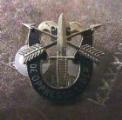Do I read you all correctly?
So Rome's empire resulted from a unified "total war" political will built on manifest destiny and Perseverance?
America's political will is fractured or has a foundation in at least two houses as described in the ariculate Rhodes analysis?
We probably are conducting FID but it seem to be more probably is less. Whats the alternative? Occupation, colonization, punish the innocent and the guilty in a country by leaving it destroyed, genocide.....FID under the guise of COIN and Stability and Reconstruction satisfies the political will and leaves USA to believe we are as great as we think we are. As my insightful interpreter asked "what gives the US the right to do these things (Iraq Afghanistan)?"




 ?).
?).



 .
.








Bookmarks